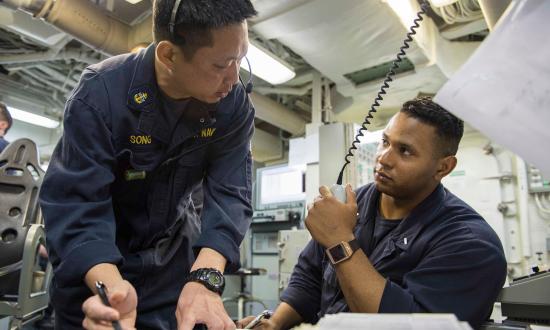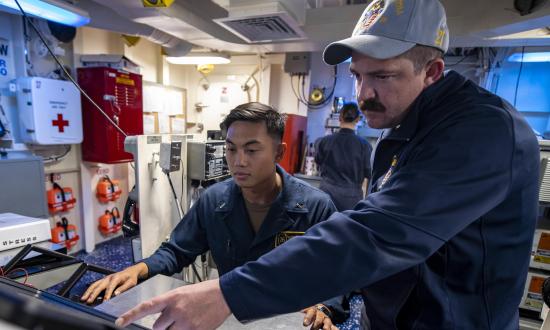A wise master chief once told me, “Junior officers don’t know what they don’t know.” This is especially true for newly commissioned division officers, eager to begin surface warfare careers. This is the last article in a seven-part series aimed at sharing lessons I have learned from my experiences, mistakes, and mentors. These lessons, or “truths,” are shared so ensigns can avoid making the same missteps, implement positive ideas sooner, and boldly take their first steps on the path to “knowing.”
Truth #1: SWO Qualification Is a First-Tour Officer’s Top Priority
Truth #2: Attitude Is Everything for SWO Division Officers
Truth #3: Division Officers Must Learn to “See the Future”
Truth #4: The Division Officer and Chief Must Form a Powerful Partnership
Truth #5: Individual Sustainment Is Key to Team Success
Truth #6: SWO Ensigns Must Understand How to Set the Tone
Serving as a division officer on board a warship is not easy. In fact, it can be very challenging and, at times, extremely difficult. The Navy’s newest officers will surprise themselves in how much personal development these challenges yield in a short period of time. Yet, it is important to remember that becoming a proficient division officer does not happen overnight and instead requires persistence and hard work. It requires fight. “Don’t give up the ship!” No matter how hard things get, junior officers must continue to fight for victory.
The Road to Proficiency
Part of embracing this difficult road is accepting that, especially as a new ensign, junior officers will make mistakes. I know I did. However, these mistakes typically reflect some level of discomfort, in which an officer forced themselves into a position to learn. It would be much easier to hide in a stateroom than ask to be the junior officer of the deck for the next underway replenishment. It is the willingness to be uncomfortable that will eventually translate to comfort and confidence.
Once in position for a learning opportunity, mistakes can be viewed in the context of an officer’s response to them. Officers that run to their stateroom after the evolution debrief in despair at having performed poorly do not benefit compared with those who take notes, follow up with fellow watchstanders, and contemplate how to do better in the future. Over time, mistakes will become less significant and less frequent. A division officer’s willingness to boldly face the experiences required to achieve such improvement makes the difference in their professional development.
Do Better
When victory escapes a junior officer, it is important to avoid the natural reaction to this unfortunate circumstance—blaming someone or something else for the failure. A division officer must fight to avoid this sad state.
The answer to this situation is surprisingly simple: Do better. A division officer not happy with how they are received at quarters should speak up. An ensign not satisfied with a personnel issue should get with their chief to discuss it. A junior officer who fails an oral board should study harder.
Zone inspections are a routine way the command can assess space cleanliness and material condition. Khaki personnel gather in the wardroom weekly, form small teams, receive training, and then evaluate an assigned space. All personnel return to the wardroom at an appointed time to brief the captain on the spaces inspected. Ensign Binos and Ensign Inlet dutifully listen as it is announced that their respective spaces failed.
Ensign Binos can be found hours afterward, sitting on the wardroom sofa explaining to anyone who will listen how unfair the inspection was, how the inspector was never going to pass the space, and how unnecessary it was for the briefer to announce such a failure when called on. In contrast, Ensign Inlet visits his spaces immediately afterwards, speaks to his chief about what went wrong, develops a plan for future success, and briefs his department head. It is clear who is doing better.
Do better is all about embracing responsibility and accountability. Blaming
other people or circumstances for the loss results when a sense of ownership is lacking. This principle can be applied endlessly—to physical fitness, professional qualifications, mentorship, communicating back home. This concept is simple to grasp but difficult to execute. Striving to do better will also make the division officer be better.
Professionalism
There is an important victory that can be achieved on a daily basis: professionalism. This word encompasses the many admirable qualities all officers strive to embody: honor, tact, punctuality, discipline, competence, hard work, dedication, selflessness, respect, firmness, compassion.
Professionalism extends well beyond paperwork and task accomplishment, as it drives daily interactions with the chief, divisional sailors, officers in the wardroom, off-ship entities, media, and civilians. It drives how division officers choose to dress when going to work out, come to work, leave the ship on overseas liberty and attend the command holiday party. It restricts an ensign from regularly meeting enlisted sailors for drinks at the local bar, befriending enlisted personnel on social media, developing inappropriate relationships with fellow sailors and other officers. It removes trying to be the “cool” officer as motivation for decision-making.
Most divisional sailors are likely very close in age to the newly commissioned officer. A professional line in these relationships must be drawn and maintained. Sailors do not need more friends—they need leaders. Better still, they want leaders. Division officers should learn to be approachable and trustworthy while maintaining this line.
Thank You for Your Service
A uniformed service member walks down the street and is stopped by a stranger who says, “Thank you for your job” and offers his hand to be shaken. Really? No, of course not. The stranger stops the service member to say, “Thank you for your service.” And what is true of service? Service is sacrifice—sacrifice that ranges from a workday to months spent away from family and friends to the 24/7 nature of the division officer role.
In the hit television show Mad Men, two lead characters face-off. The up and coming ad girl, Peggy, is upset because her boss, Don, received an award for a commercial the advertising agency produced. Peggy felt that she deserved some recognition for the advertisement, since she came up with the original idea. After explaining that he picked her idea from a long list she provided and transformed it into a usable commercial, Don is quick to remind her that, “It’s your job. I give you money, you give me ideas.” To which Peggy exclaims, “And you never say thank you!!” Don retorts, “That’s what the money is for!”
Is everyone not like Peggy sometimes? Wanting to be praised, wanting to be told, “Great job!” Does every division officer turning in evaluations two days early not anticipate a high-five? Or listen closely to a special evolution debrief, wanting to be called out by name for a key decision?
And yet what is true? This hard work is not a gift. No, it is instead all part of the division officer’s role for which each officer is compensated financially. This is not to say money is the sole motivator, but instead that the temptation to model Peggy’s behavior should be avoided. She has allowed the lack of praise and thanks from her boss to affect her. Peggy did her job and contributed to making a great commercial, for which the agency was awarded. This victory should be enough for her. Division officers must teach themselves not to need this type of validation, turning compliments and acknowledgement into lifeblood needed to survive.
As officers in the armed forces, the expectation for sacrifice is much higher, the cost of victories much greater. When the words “service,” “sacrifice,” and “victory” are fully connected, it shows. Instead of needing validation for efforts, division officers can focus their energy on achieving victory. Not wasting time trying to show off in front of peers or seniors, and instead working tirelessly behind the scenes to get even one step closer to achieving a goal.
At quarters, a department head asks a division officer if an off-ship entity has been contacted. The division officer replies that the given phone number has been called three times, two voicemails have been left, and an email has been sent, but still no response. For the department head, the short answer is no.
In this example, an ensign is too concerned about having his or her efforts validated. But what is true of these efforts? They have been in vain since the off-ship entity has yet to be reached and victory has yet to be achieved. Instead of seeking validation for efforts that have been in vain, division officers should continue to fight and continue to adapt, until that entity is reached, that qualification is achieved, the piece of equipment is repaired, or the personnel issue is resolved.
Division officers will learn to quickly assess when victory has been achieved and when it has not. These officers should not waste time explaining how hard they worked, how much effort they applied, looking for someone to tell them, “Great job!” Instead, time and energy should be devoted to achieving victory—it is their job. If someone says, “thank you,” that’s nice. If not, officers should keep marching along the path of service, motivated by the work they do for others.
Debrief: With victory always on their mind, division officers will respond positively to mistakes, guaranteeing improvement for the future. When victory is not achieved, they will look no farther than a mirror to determine what they can Do better. Officers will aim to be professional in everything, not expecting praise and thanks for their work. They will understand that their choice to serve this great nation demands the sacrifice they are ready and willing to make.
A Postscript to the Junior Officers Who Read the Seven Truths
Thanks for taking the time to read this advice. I hope that at worst you found it thought-provoking, and at best you found it helpful. My hope is that you are able to draw on even a single concept discussed and apply it to your role as a division officer today. If you are feeling overwhelmed, you should. Becoming a successful division officer is a complex process and takes time.
Not to worry—you are not on this journey alone. Instead, you are joined by your peers, leaders, mentors in your corner, and the Navy team of which you are a part. I would encourage you to revisit these truths in the coming months. As your experience on board increases, so will your understanding of this advice.
I want to again emphasize how personal growth and leadership development are tied to your attitude. If you think you know everything, refuse to seek the guidance of mentors, and would rather do what you want instead of asking for help, then you have not left much room for growth. To be better, you first have to be open to it. Instead of refusing to extend yourself or try something new, give it a shot. You just might be surprised with a new and improved version of yourself staring back at you in the mirror.
While I recorded these “truths,” I certainly did not execute them perfectly as a division officer. There is always room to improve, to do better, to learn something new, to better take care of your team. It is likely that in the future you will think to yourself that you finally have a good handle on divisional matters, your qualification is complete, and life is good. Around this time, something will come up that you have never dealt with before. Think of it as yet another opportunity to grow.
I know that a single day serving as a division officer can feel like ten. You become convinced that a 30-day underway was actually an entire year. But isn’t anything of real value in life something you fought for, something that challenged you, something that pushed you? Four years of division officer time can be daunting at the onset, but in the grand scheme, it really is not that long at all. Your first tour will fly by and be immediately followed by your second. By the time you feel like you are really hitting your stride, it will be time to transfer.
In the whirlwind that is ship life, focus on making the most of your experience and enjoying every minute of it. Before you know it, you will be resting comfortably on shore duty, where your time as a division officer lives only in your memory. If you choose to continue and sign your department head contract, you will soon find yourself in a job with less direct and less frequent interaction with sailors. The unique dynamic found in a Navy ship division will be in the past. Each day, make the most of the time you have in this special role. It is fleeting.
Fair winds and following seas. Victory awaits…
Sincerely,
Audrey Talbot






